Cut through the noise and understand what’s truly driving markets, as this new political and economic reality evolves. Get your free two-week trial of The Sevens Report: Everything you need to know about the market in your inbox by 7am, in 7 minutes or less.
Politics interjected itself into the markets Tuesday, this time via a release of emails from Donald Trump Jr. regarding his meeting with Russian surrogates. But that wasn’t the only news out of Washington yesterday, as Senate Majority Leader McConnell has cut short the August recess to work on healthcare.
While those two issues dominate the media, the really important Washington-related events (from a market standpoint) continue to be largely ignored. So, I wanted to take a moment and provide a another Political Update.
Issue 1: Russia
Potential Market Impact: Not very big unless something substantial changes.
As has been the case for months, this topic dominated the headlines and drowned out almost everything else in the markets Tuesday.
But, as has also been the case, from a market standpoint the whole Russia subject remains much more of a media issue than a markets issue. I don’t say that to minimize any opinion you might have on the matter, but the fact is that until there is irrefutable evidence that Trump (or Trump’s team via direction from Trump) acted explicitly to interfere with the election outcome or break some other law, impeachment or removal of Trump remains an extremely remote possibility. Again, that’s because impeachment is a political, not a judicial, process, and it’ll take a lot for Republicans to impeach a sitting Republican President (and the same goes for Democrats).
Going forward, this Russia issue clearly isn’t going away as the Trump Jr. emails, while not directly incriminating, aren’t exactly exonerating, either. For now, any “Russia” dips should be bought.
Issue 2: Healthcare Bill
Potential Market Impact: Positive if the Healthcare Bill Fails
Looking elsewhere in Washington, Senate Majority Leader McConnell cancelled much of the Senate’s summer holiday when he delayed the start of August recess until August 14, giving our good public servants just three weeks off, as opposed to the normal five or six. The ostensible reason for the removal of the recess is to work on the healthcare bill, which at this point appears all but dead.
From a market standpoint, healthcare is only really important due to it’s effect on tax cuts. In many ways, markets want healthcare to fail, and fail quickly, so that Republicans can focus solely on tax cuts. To boot, if healthcare fails, it’s almost a certainty that Republicans will exit 2017 with almost no legislative accomplishments, so the pressure will be on to cut corporate taxes in 2018… especially given it’s an election year.
The bottom line with healthcare is this: Passage of an Obamacare repeal/replace bill still looks slim, but that’s ok for markets as long is it doesn’t endanger tax cuts in 2018. At this point, the sooner Republicans move on taxes, the better, so don’t be surprised by a relief rally if the healthcare bill officially fails in the Senate.
Issues 3 & 4: Debt Ceiling Extension & Government Shut-down
Potential Market Impact: Very negative.
The media is so myopically focused on Trump and healthcare that it’s largely ignoring the actual important, Washington-related events in 2017, which are the debt ceiling and government shutdown.
The debt ceiling must be extended by early October while the current government spending bill ends on Oct. 1 (if another spending bill isn’t passed, the government shuts down).
Now, the probability of either event happening is slim, because Republicans control Congress and the White House, and that would be the quintessential shooting of oneself in the foot. However, that doesn’t mean we won’t walk right up to the line again and give everyone a scare.
Bottom line, Washington remains much more bluster than bite for markets, but we are getting close to events that could actually move markets. Regardless of the headlines and sensationalism, the key is to look past the noise and stay focused on that debt ceiling and government shutdown in late-September/early October. That’s really when Washington might (rightly) begin to weigh on stocks.
The Sevens Report is the daily market cheat sheet our subscribers use to keep up on markets, seize opportunities, avoid risks and get more assets. Start your no obligation two-week trial today.



 Case in point, Tuesday’s firing of FBI Director James Comey moved markets yesterday, and I wanted to cover what that means going forward (it’s a mild and potentially negative, but not a bearish game changer). Now, to be clear, the market is agnostic to the politics of this drama and as such so am I. Whether you or I think the firing was a coverup or justified, it matters not from a market standpoint, so as I always do with political coverage, I will strictly stick to market implications.
Case in point, Tuesday’s firing of FBI Director James Comey moved markets yesterday, and I wanted to cover what that means going forward (it’s a mild and potentially negative, but not a bearish game changer). Now, to be clear, the market is agnostic to the politics of this drama and as such so am I. Whether you or I think the firing was a coverup or justified, it matters not from a market standpoint, so as I always do with political coverage, I will strictly stick to market implications.